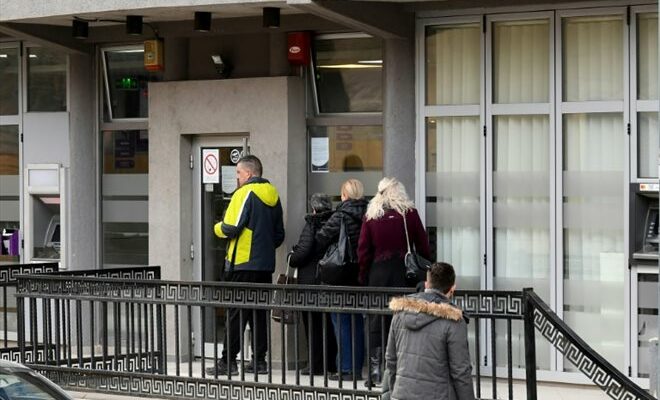In front of a bank in Leposavic, northern Kosovo, January 29, 2024 (AFP/STRINGER)
By wanting to ban transactions in Serbian dinars from Thursday, Kosovo – where the euro is the official currency – is taking the risk of a new crisis with Serbia, and new admonitions from the West who see it as a useless provocation.
According to the new regulations which are due to come into force on February 1 at midnight, “the only currency accepted for cash payments or transactions in Kosovo is the euro.”
At the end of the war, in 1999, Kosovo, then a Serbian province, chose the Deutschmark as its currency – the Yugoslav dinar was in the process of disappearing. In 2002, when Germany switched to the euro, Kosovo followed and made it its de facto national currency – no agreement exists with the EU.
The Serbian dinar was, however, tolerated in predominantly Serbian areas, and its ban risks reviving tensions in these towns and villages where many people work or have worked for Serbian institutions, and whose salaries or pensions are therefore paid in dinars. .
Belgrade, which has never recognized the independence of Kosovo, proclaimed in 2008, supports the Serbian community there, estimated at 120,000 people, through jobs and financial aid. Serbia’s budget provides around 120 million euros for Kosovo each year.
– Sabotage? –
For Serbian journalist and political commentator Bosko Jaksic, it is the Kosovo Serbs “who will suffer the most”.

Kosovo Prime Minister Albin Kurti during a speech at the Davos Economic Forum, January 18, 2024 (AFP/Archives/Fabrice COFFRINI)
“This resembles, in my opinion, a desire of the [Premier ministre kosovar] Albin Kurti to sabotage the negotiation process, which seemed to be on the right track,” he explained to AFP. “The diplomatic and political consequences (of such a decision) will be much more serious than the monetary consequences.”
Several Western governments have already criticized Pristina’s decision and warned against a new bout of fever.
“We are concerned about the impact of the regulation in particular on schools and hospitals, for which no alternative process seems viable at the moment,” wrote the ambassadors of France, Germany, Great Britain, Italy and the United States in a joint statement on Saturday.
“The regulations will also have a direct impact on the daily life of the overwhelming majority of Kosovo Serbs who receive payments (and) financial aid from Serbia,” add the ambassadors, calling for a “suspension of the “entry into force of the regulations to allow a sufficiently long transition period and clear and effective public communication”.
But no one in Pristina gives the impression of wanting to back down. The Kosovar authorities presented this new regulation as a way to fight corruption, money laundering and counterfeit currency.

At the entrance to a bank in Mitrovica, northern Kosovo, January 29, 2024 (AFP/STRINGER)
Deputy Prime Minister Besnik Bislimi explained that this would stop the flow of unregulated money from Serbia, saying that “money continues to cross borders in travel bags and then be distributed by unregistered and unlicensed offices.
The Serbian government sees this as nothing more than a provocation that would likely derail negotiations aimed at normalizing relations between Belgrade and Kosovo “once and for all.”
The year 2023 has already been marked by peaks in tensions between Serbia and Kosovo. In the spring, the election of Albanian mayors in Serbian areas with 3% turnout led to demonstrations in which NATO soldiers were injured.
In September, the death of a Kosovar police officer and the discovery of an over-armed commando made up of Serbs once again raised fears of a violent escalation.
Ahead of February 1, Kosovo’s largest Serbian party, the Serbian List, warned that banning the dinar risked endangering “the physical survival of the Serbian people.”
© 2024 AFP
Did you like this article ? Share it with your friends using the buttons below.




